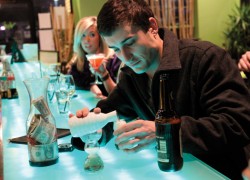
In college, students have almost unlimited possibilities and freedoms as they break away from adolescence and become adults while gaining their degree, but those under the age of 21 still cannot legally drink alcohol in the United States. Many students enhance their learning experience by studying abroad, which increases wisdom and also provides underage students the opportunity to drink legally.
Students who are under the age of 21 almost triple their drinking habits while studying abroad, according to a study done by U. Washington.
“I was the only UA student within my program. I did take advantage of the lower drinking age, but not as much the nightlife,” said Keely Dye, a U. Arkansas senior majoring in international relations, European studies and economics. “A lot of the drinking that took place within my study abroad experience was with my homestay family. They would have wine or spirits at almost every dinner and any celebrations I was a part of.”
Most countries have lower drinking ages than the U.S., which cause students to become more attracted to the party life abroad.
“I definitely think other students took advantage of being able to go out and drink, legally,” said Jessica Hawley, a UA senior majoring in Spanish. “That was the most popular thing to do for the majority of the students in the program.”
Studying abroad is a great opportunity for students to gain experience with other cultures while gaining credits toward their degree, but often students are distracted from this goal from overseas nightlife.
“My observation is that students do take advantage of the lower drinking age, not necessarily with the intention of abusing the privilege, but in part to enjoy the freedom,” said DeDe Long, Director of Study Abroad and International Exchange. “Learning how to drink responsibly is so important.”
While many underage students drink in the United States, the University of Washington found that those who increased their drinking levels abroad still continued their excessive drinking when they returned home.
“Once you do start drinking, it is easier to continue doing so once you go back home,” Hawley said.
The most popular study abroad destinations for American students are the United Kingdom, Italy and Spain, all of which have a legal drinking age of 18. Germany, Greece and Luxembourg have a minimum drinking age as low as 16 while Albania and Vietnam have no drinking age at all. The United States is one of only five countries in the world to have the legal age set at 21.
A factor that causes students to drink more while abroad is the convenience.
“The major appeal of the nightlife is living in an area with public transportation. You have a set way to get home without any worry of drunk driving,” Dye said. “You also are in a program with students in the same situation as yourself: away from home, more relaxed academic schedule and more accessible nightlife with almost no age restrictions.”
The U. Washington researchers discovered that studying abroad in Australia, New Zealand and European countries caused students to drink more heavily than those who studied in Asian, African, Latin American and Middle Eastern countries.
“Students need to take responsibility for themselves abroad just like they do when they participate in college life here in Fayetteville,” Long said. “If they get caught up in drinking here, they are going to have to be extremely careful not to mimic that behavior in another country, where access may be much easier.”
Studying abroad allows the student to learn new perspectives from being in a foreign country, but if drinking becomes too much of a distraction, the chance of a lifetime can become threatened.
“I think that those who did [drink more] tended to go to class less and focus less on their studies,” Hawley said. “School and studying was not their priority.”
The cornerstone of studying abroad is to acquire knowledge not already found in the United States, and the opportunity can benefit the future of the student.
“Study abroad is a significant investment of time and money,” Long said. “What a waste it would be to throw such a great learning experience away by finding yourself without money or a passport, or on a plane home after an accident caused by poor judgment.”
The study abroad program is trying to prevent and raise awareness of binge drinking overseas.
“In our pre-departure meetings with students, we continually stress how important it is for students to be mindful of their surroundings, take care of themselves, and to represent the University of Arkansas well,” Long said. “We strongly discourage over-drinking. Over-drinking can easily put a student in a vulnerable position, this is when they get lost, hurt or robbed.”
Some students already find normal college life to be distracting enough and factoring in the culture and exciting night life of a foreign country may lead them to stray away from the aspiration of studying abroad.
“I would tell students who are apprehensive about studying abroad that they should not worry,” Hawley said. “The partying scene wasn’t for me, and I had a very enjoyable time abroad without partying. I think you can have an enjoyable time anywhere, without having to drink or hang out at clubs.”
